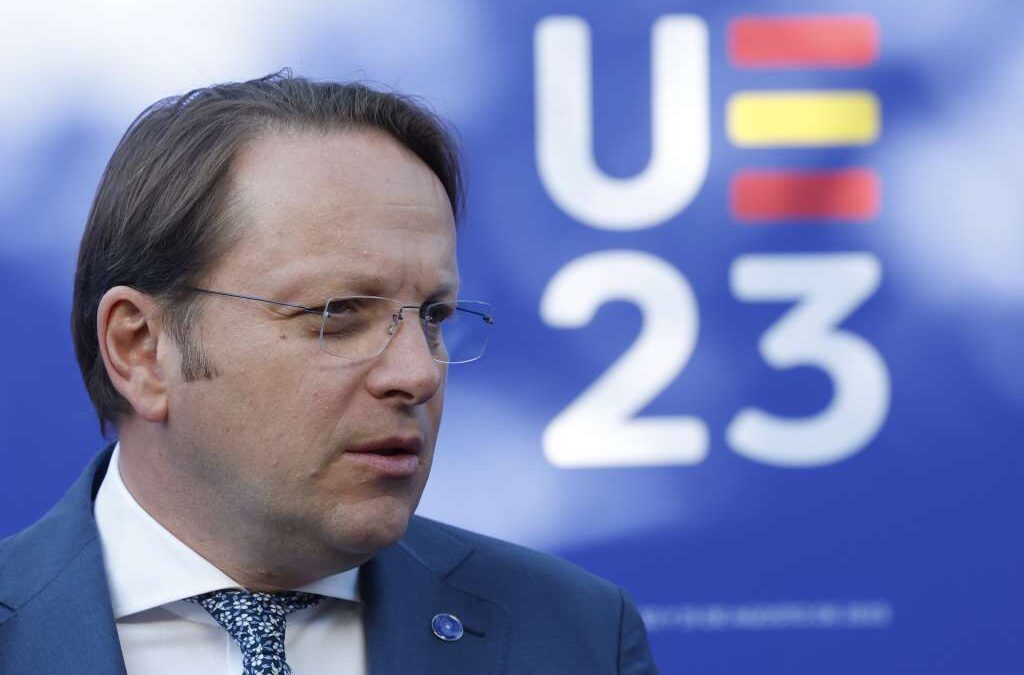 Have the article read by OpenAI (Beta). Please note that AI translations may take some time to process.
Have the article read by OpenAI (Beta). Please note that AI translations may take some time to process.Várhelyi: New plan for accelerating economic growth in the Western Balkans
Brussels (ATA) – European Commissioner for Neighbourhood and Enlargement Olivér Várhelyi said that a new plan to accelerate economic growth in the Western Balkans was being prepared. He emphasised that the economic investment plan, worth 30 billion euros, was the backbone of the connectivity and integration plan.
In the current geopolitical context, EU enlargement to the Western Balkans was more than ever “an investment in peace, security and prosperity on our continent,” Várhelyi said. “We are helping to diversify the energy mix and decarbonise Western Balkans economies, shift towards more sustainable transport systems, crowd in private sector support and move towards a greener and more digitally developed region,” he added.
“We have so far approved some 4.3 billion euros in grants, which will mobilise 15.9 billion euros in overall investments. This includes funding for 54 flagship projects in transport, energy, environment, digital transition, human capital and private sector competitiveness,” Várhelyi emphasised.
French Delegate Minister for Foreign Trade Olivier Becht said that the main objective continued to be the acceleration of relations between the countries of the Western Balkans and the common market of the European Union. (28 September)
Von der Leyen and Michel travel to Washington on 20 October
Brussels (Belga) – European Commission President Ursula von der Leyen and European Council President Charles Michel will travel to Washington on 20 October for consultations with US President Joe Biden, announced a European official.
The EU-US summit would aim to “strengthen our strategic partnership” and discuss how to tackle “common challenges” such as climate change and the state of the global economy, the anonymous source explained.
European and US leaders will also discuss the customs duties on European steel imports that former President Donald Trump introduced in 2018. Those tariffs have been partially suspended, pending a broader agreement which must be concluded by the end of October. If not, the higher customs duties will come back into full effect. According to the official, the two sides have already had “very good talks” on the issue.
In addition, Biden, Michel and von der Leyen are expected to reiterate their support for Ukraine in Washington and exchange views on possible new sanctions against Russia. This will include issues surrounding the enforcement of sanctions and cooperation with third countries through which Russia is trying to circumvent sanctions.
According to the official, the trade in Russian diamonds is also on the agenda. The G7 has been discussing for some time how to curb the trade, worth 4-5 billion dollars a year, through a diamond tracking system. (27 September)
EU: Fewer illegal crossings at the Austrian-Slovenian border
Brussels (APA) – According to the European Commission, the situation at the Austrian-Slovenian border has “improved”, following the introduction of temporary border controls. A Commission spokeswoman confirmed in Brussels on Tuesday that the number of illegal border crossings had fallen. However, the Commission maintains its position that internal border controls should only be used in exceptional cases and should be limited in time.
The Commission also reacted to German plans, which became known on Monday: German Interior Minister Nancy Faeser had announced stationary border controls at the Polish and Czech borders to prevent illegal entries into German territory. The spokeswoman stressed that the Commission was in close contact with the member states that had notified Brussels of the controls. She also stressed that the Slovenian and Austrian authorities would cooperate more closely, which the Commission welcomed.
Borders between Schengen members are not controlled as such. However, it is possible to introduce exceptional controls for a limited period of time and for justified reasons. For example, France controls its border with Italy because of the threat of terrorism and illegal immigration. Austria controls its borders with Hungary and Slovenia because of migratory pressure on the EU’s external borders. The exceptional controls have to be newly approved every six months. (26 September)
European Public Prosecutor’s Office announces an investigation in Bulgaria related to agricultural fraud
Brussels/Luxembourg (BTA) – The European Public Prosecutor’s Office (EPPO) has announced that under its authority, officers from the Directorate General for Combating Organised Crime (DGCOC) have detained three people and searched six locations in an investigation into an organised crime group that illegally received European Union agricultural funds.
On the basis of the investigative actions carried out by the DGCOC and the Bulgarian State Agency for National Security, as well as the evidence and documents seized, it was concluded that the suspects had provided false information on behalf of others to obtain EU funding. According to the clues, instead of applying for funds for a large plot of land, the suspects divided the area and used people of “low socio-economic status” as proxies to apply for agricultural benefits, a press release said.
The suspected leader of the organised crime group was authorised by the front men to act as their representative to the State Agriculture Fund and banks. He was thus able to obtain EU funds and full control over the projects.
Two employees from the State Agriculture Fund and the regional agricultural office in Sevlievo are suspected of complicity. They may have facilitated the activities of the criminal group by providing information and advice on the relevant operational programme and project implementation checks. It is stated that a civil servant is among those arrested. The total amount of damage has yet to be established, the press release added. (26 September)
This is a compilation of the European coverage of enr news agencies. It is published Tuesdays and Fridays. The content is an editorial selection based on news by the respective agency.
